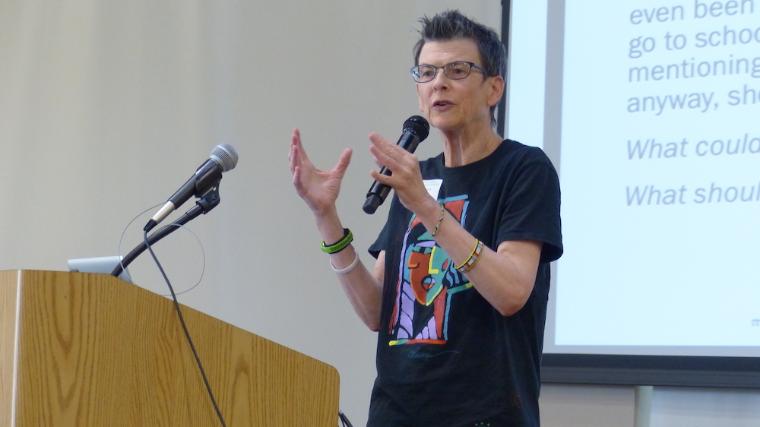
Highlights from "Journeying Together"
Margaret McLean, Center associate director and director of Bioethics, presented on "Focusing an Ethical Lens" at SCU's conference on May 10, "Journeying Together: Faith, Spirituality, and Mental Health."
The following is a guest post by Jenna Bagley, an Ethics Center student research assistant in Bioethics focusing on behavioral health and ethics. She graduates in June with a triple major in Psychology, Spanish Studies, and Women's and Gender Studies, and a double minor in Sociology and Latin American Studies.
Mental health issues are prevalent in communities everywhere; approximately 17.9 percent of adults, nearly one in four people, experience mental illness in a given year.[1] These issues are especially relevant in faith communities, as 15.1 percent of people in this country who seek services for their mental health problems seek them from a religious provider.[2] In light of these recent statistics, the Ethics Center hosted and co-sponsored "Journeying Together: Faith, Spirituality, & Mental Health," at SCU on May 10, for a large audience of religious leaders and mental health professionals. The conference featured seven presentations by experts in their field, designed to help break the silence and reduce the stigma about mental illness in faith communities. A principal goal was to also provide attendees with skills, resources, and an ethical framework for responding to and advocating for individuals and families affected by mental health issues.
The day began with a talk given by Simran Singh, El Camino Hospital, who spoke about the role of faith and spirituality in mental health. Margaret McLean, Center associate director and director of Bioethics then discussed critical ethical issues surrounding mental health scenarios in religious communities. As food for thought, she presented a case study about a pastor faced with a parishioner struggling with depression. A trialogue entitled “My Lived Experience,” featured NAMI presenter Dawn Brown, George Aranha of Santa Teresa Catholic Church, and Thomas Plante, professor of psychology and director of the SCU Spirituality and Health Institute and adjunct clinical professor of Psychiatry and Behavioral Sciences at Stanford University.
In the afternoon, Evelyn Castillo Tirumalai, a senior mental health program specialist with SCU's Behavioral Health Services, led a training session on suicide prevention and intervention. The conference concluded with a panel during which Kim Engelmann of West Valley Presbyterian Church, George Papageorge of the Greek Orthodox Metropolis of San Francisco, and Nancy Kehoe, assistant clinical professor at Harvard Medical School, offered practical and prayerful tools for well-being.
[1] Any Mental Illness (AMI) Among Adults. (2015). http://www.nimh.nih.gov/health/statistics/prevalence/any-mental-illness-ami-among-adults.shtml
[2] Kovess-Masfety, V., Evans-Lacko, S., Williams, D. et al. The Role of Religious Advisors in Mental Health Care in the World Mental Health Surveys. Soc Psychiatry Psychiatr Epidemiol (2017) 52: 353.
